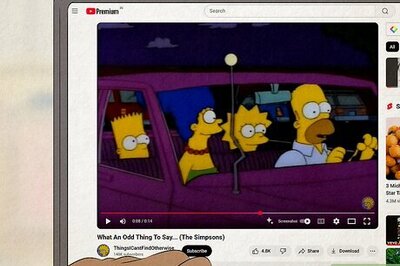
views
New Delhi: Let the 'Aarakshan' polemic, the subsequent protests across India and Prakash Jha's acquiescence to cut "objectionable" scenes be a warning to filmmakers keen on social commentary. Jha shares his plight with directors who have had a run-in with the authorities over creative licensing and freedom of expression in a country divided on the lines of caste, language, class and religion.
Jha's Aarakshan, based on caste-based quota system in higher educational institutions, has been banned in Uttar Pradesh and Punjab, with protests erupting in Maharashtra, UP, Punjab, Bihar and Andhra Pradesh over what pro-reservation activists term "offensive" references to India's socially backward classes. Jha has been repeatedly maintaining that the film shows both sides of the debate and raises uncomfortable questions on systemic corruption that arises out of segregation.
The Censor Board, often criticized for clamping down on films that have the potential to split civil society, gave Aarakshan a U/A certificate. The largely independent body has taken recommendations from a panel of the National Commission for Scheduled Caste and Schedules Tribes, who reviewed the film, to decide what scenes and dialogue could incite trouble if it was released uncut.
What are people on the streets protesting?
The protestors on the street – who are tearing posters, burning effigies and threatening bodily harm to the cast and crew – seems to have arrived at a conclusion even before the film was released for public viewing on Friday; that the film is hurtful towards the socially backward classes. Both Punjab and Uttar Pradesh go to poll next year and their leaders are acutely conscious of an issue that has historically divided civil society into two distinct socio-economic classes. Vote bank politics has manifested itself into creating a storm out of a non-issue as the director readies to release Aarakshan globally on August 12.
Controversies are not new to Jha whose 2003 film Gangaajal exposed the pale underbelly of the criminal justice system in the country and ran into political trouble. The tug-of-war between social and socially responsible cinema will continue but new age filmmakers with a political statement to make have always faced stiff opposition whenever their films contradicted religious or political interests.
Responsible filmmaking vs Intolerance?
India is home to the world's largest film industry but creative filmmakers often complain of an intolerant and restrictive environment, political bullying or censorship whenever a subject touches on anything remotely controversial. Bengali director Q's 'Gandu' could not be screened in Mumbai after police cancelled its screening repeatedly apprehending trouble from local activists. The upholders of social and moral justice are known to threaten and abuse filmmakers if they disapprove of a subject they deem improper.
Malayalam filmmaker Bijukumar Damodaran stirred up trouble over his 2008 socio-political film Raman and like most talented people in the business of movies, he featured it at international film festivals where it was lauded. His film Saira was the opening film in the Tous Les Cinemas Du Monde (Cinemas of the World) section at the Cannes International Film Festival in 2007.
Gulzar's 1975 political biopic Aandhi flared a wildfire that could not be doused and the film's release was held up. Said to be based on the life of former Indian Prime Minister Indira Gandhi and her interpersonal relationships with Jawaharlal Nehru and Feroze Gandhi was considered simply too hot a subject to let pass uncut.
Of Sins and Shiney Ahuja
Remember the 2005 film Sins? Based on a Spanish movie El Crimen Del Padre Amaro, this film by Vinod Pande showed a Catholic priest played by Shiney Ahuja sexually exploiting an underaged girl played by Seema Rehmani. It triggered off a hail of protests from Roman Catholic organisations that demanded its withdrawal for showing an ordained person in bad light. TV channels refused to run promotional material and though activists claimed the Christian community's sentiments were hurt the director remained adamant that the film was not blasphemous.
The only other director in Hollywood to trigger this kind of reaction in orthodox society is perhaps Oliver Stone with his Platoon (1986), Born on the Fourth of July (1989), JFK (1991), and Natural Born Killers (1994).
But directors who strive to make films relevant to society should not lose heart. The Censor Board has shown exceptional maturity in the past in certifying contentious projects. Above all, the audiences in India are now demanding liberation of cinema from political agenda. They will find a way to good films.




















Comments
0 comment